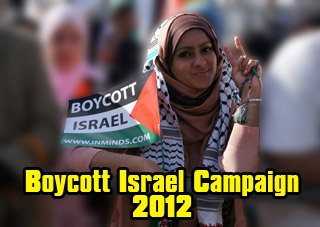
 Innovative Minds © 2014. All Rights Reserved. www.inminds.co.uk | ||||
Israeli exporters forced to slash prices due to boycottMa'an News Agency Israeli exporters have been forced to cut prices in part because of a worldwide boycott of Israeli products in protest of Israel’s occupation of Palestinian land, a leading industry association reported this week. Israeli exporters have been “losing foreign markets and customers because of the global economic crisis and a growing anti-Israel boycott of locally made products following Operation Cast Lead.” The findings were made available by the Israel Manufacturers Association on Sunday, and published in the Jerusalem Post the following day. According to the report, 21 percent of Israeli exporters face difficulties selling abroad, particularly to the UK and “Scandinavian countries.” The boycott and the financial crisis were cited as the issues behind a forced price cut by 66 percent of Israeli exporters. The report emerged as boycott campaigners announced that they are stepping up their efforts in Palestine and internationally. On Monday in Ramallah, a press conference was held by the Palestinian National Boycott Committee (BNC) in Ramallah, which urged local and international parties to continue their boycott actions. They called the boycott a “tool to realize long-denied Palestinian national rights.” Representative of the BNC and the Palestinian NGO network Allam Jarrar called Land Day an appropriate time to call a Boycott and Divestment Day because both events shared the same goal. “In Palestine the boycott of Israeli products, institutions and companies is once again gaining ground. Increasing numbers of students, women and ordinary people see the boycott of Israel as an effective form of resistance and are beginning to make it a part of their daily lives,” Omar Asaf, another representative of the BNC and a member of the National Higher Committee for the Defense of the Right of Return said. “In the last month,” he continued, “regional and local committees have been formed to promote the boycott of Israeli products and an end to ties between Palestinian organizations, and their Israeli counterparts,” According to BNC more than 75 demonstrations, protests and festivals were held in 19 countries to promote the Global BDS day of action. Source: http://www.maannews.net/en/index.php?opr=ShowDetails&Do=&ID=36788 Israeli exports hit by European boycotts after attacks on GazaRachel Shabi, The Guardian A fifth of Israeli exporters report drop in demand as footage of Gaza attacks changes behaviour of consumers and investors Israeli companies are feeling the impact of boycott moves in Europe, according to surveys, amid growing concern within the Israeli business sector over organised campaigns following the recent attack on Gaza. Last week, the Israel Manufacturers Association reported that 21% of 90 local exporters who were questioned had felt a drop in demand due to boycotts, mostly from the UK and Scandinavian countries. Last month, a report from the Israel Export Institute reported that 10% of 400 polled exporters received order cancellation notices this year, because of Israel's assault on Gaza. "There is no doubt that a red light has been switched on," Dan Katrivas, head of the foreign trade department at the Israel Manufacturers Association, told Maariv newspaper this week. "We are closely following what's happening with exporters who are running into problems with boycotts." He added that in Britain there exists "a special problem regarding the export of agricultural produce from Israel". The problem, said Katrivas, is in part the discussion in the UK over how to label goods that come from Jewish settlements in the occupied West Bank. Last week British government officials met with food industry representatives to discuss the issue. In recent months, the Israeli financial press has reported the impact of mounting calls to boycott goods from the Jewish state. Writing in the daily finance paper, the Marker, economics journalist Nehemia Stressler berated then trade and industry minister Eli Yishai for telling the Israeli army to "destroy one hundred homes" in Gaza for every rocket fired into Israel. The minister, wrote Stressler, did not understand "how much the operation in Gaza is hurting the economy". Stressler added: "The horrific images on TV and the statements of politicians in Europe and Turkey are changing the behaviour of consumers, businessmen and potential investors. Many European consumers boycott Israeli products in practice." He quoted a pepper grower who spoke of "a concealed boycott of Israeli products in Europe". In February, another article in the Marker, titled "Now heads are lowered as we wait for the storm to blow over", reported that Israelis with major business interests in Turkey hoped to remain anonymous to avoid arousing the attention of pro-boycott groups. The paper said that, while trade difficulties with Turkey during the Gaza assault received more media attention, Britain was in reality of greater concern. Gil Erez, Israel's commercial attache in London, told the paper: "Organisations are bombarding [British] retailers with letters, asking that they remove Israeli merchandise from the shelves." Finance journalists have reported that Israeli hi-tech, food and agribusiness companies suffered adverse consequences following Israel's three-week assault on Gaza, and called for government intervention to protect businesses from a growing boycott. However, analysts stressed that the impact of a boycott on local exporters was difficult to discern amidst a global economic crisis and that such effects could be exaggerated. "If there was something serious, I would have heard about it," said Avi Tempkin, from Globes, the Israeli business daily. Israeli companies are thought to be wary of giving credence to boycott efforts by talking openly about their effect, preferring to resolve problems through diplomatic channels. Consumer boycotts in Europe have targeted food produce such as Israeli oranges, avocados and herbs, while in Turkey the focus has been on agribusiness products such as pesticides and fertilisers. The bulk of Israeli export is in components, especially hi-tech products such as Intel chips and flashcards for mobile phones. It is thought that the consumer goods targeted by boycott campaigns represent around 3% to 5% of the Israeli export economy. Source: http://www.guardian.co.uk/world/2009/apr/03/israel-gaza-attacks-boycotts-food-industry
Exporters suffer anti-Israel boycottsSharon Wrobel, The Jerusalem Post Local exporters are losing foreign markets and customers because of the global economic crisis and a growing anti-Israel boycott of locally made products following Operation Cast Lead, the Israel Manufacturers Association said Sunday. "In addition to the problems and difficulties arising from the global economic crisis, 21 percent of local exporters report that they are facing problems in selling Israeli goods because of an anti-Israel boycott, mainly from the UK and Scandinavian countries," said Yair Rotloi, chairman of the association's foreign-trade committee. A survey conducted among 90 exporters from a variety of sectors found that 53% had lost foreign markets and customers as a result of the global economic crisis. In addition, 62% said they were having trouble collecting payments from foreign clients, while 49% said their customers have asked to pay in installments. Foreign customers had forced 66% of Israeli exporters to cut prices because of the economic climate, the survey showed. Twenty-nine percent of exporters reduced business travel abroad by more than 30%, 11% cut it 20%, 6.5% reduced it 10% and 43% reported no change. Twenty-six percent of exporters said business visits by their foreign customers had declined. Source: http://www.jpost.com/servlet/Satellite?cid=1238354477394&pagename=JPost%2FJPArticle%2FShowFull Also Of InterestPage URL: http://inminds.com/article.php?id=10286
|
|
Support Us
If you agree with our work then please support us.Campaigns INMINDS Facebook Live Feed Latest Video's
INMINDS Twitter Feed Tweets by @InmindsComFeatured Video's
You need Flash player 8+ and JavaScript enabled to view this video.
[all videos (over 200)..] Featured MP3 Podcast  "Prisoners of Faith and the faith of prisoners rotates around three important concepts. One is subber or patience, the second one is sacrifice because one cannot have patience if you are not prepared to sacrifice, and thirdly the concept of shahadah or martyrdom because if we have not been taught how to face failure then our lives become difficult, if we have not been taught how to face suffering our lives become even more difficult, and if we are not taught how to face death our lives are utterly miserable when it happens to us or to those close us.." Veteran of the armed struggle against apartheid in South Africa, he was one of the youngest people to be imprisoned on Robben Island. Islamic Human Rights Commission 10th Anniv. Nov 2007 [19min / 8Mb] [all podcasts..] Newsletter Feedback |
 |
 |












































